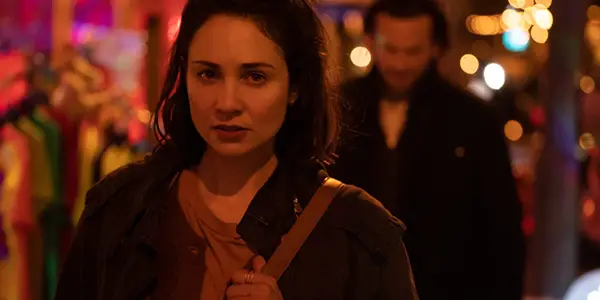DISAPPEARANCE AT CLIFTON HILL: A Commendable Cascade of Loose Threads

Kentucky-based Journalism, Political Science and Creative Writing grad who thinks…
Although its atmosphere suggests a sluggish crime thriller, Disappearance at Clifton Hill (directed by Albert Shin) hits the ground running. Within four minutes of pressing play, the viewer has watched the eponymous disappearance take place. What’s more, we have seen the faces of the culprits – what follows, then, is the true driving question of the film: Why was the crime committed? And is everything quite as it seems?
Viewers are bludgeoned with those questions as they traipse further into the film’s neon world. It is beautiful, and man is it atmospheric, and there are tigers, too. Oh yeah, and David Cronenberg has a podcast. These aspects do buoy Disappearance at Clifton Hill, but a lackluster script and uninteresting characters keep the film from truly holding water.
A beautiful, bumpy ride into Clifton Hill
Our protagonist is Abby (Tuppence Middleton, Sense8 and Jupiter Ascending), a young and unwitting witness to the disappearance in question. Though Abby watches the crime go down as a seven-year-old, the narrative of the film follows her as a young adult struggling with the recent loss of her mother.
We know very little about Abby’s past or personality. We do know that Abby is the loose cannon, and her sister Laure (Hannah Gross, Mindhunter and Joker) is the straight-shooter. We know this because Laure wears very responsible-looking glasses at night, and she often rubs her temples in frustration – that is to say, she is the perfect caricature of the disapproving older sister. I can say very little else about Laure.

Unfortunately, Abby’s sister is not the only one-dimensional character. The bit players who mar Abby’s progress routinely deliver eye-rollingly villainous lines, while those who attempt to help her solve the mystery bring little to the table aside from platitudes. (Perhaps this is par for the course for a movie that features two magicians/tiger tamers plucked straight from the ‘80s. Their inclusion is not as delightful as it should be.)
Still, I found myself pitying members of the talented cast who were strapped with these roles, including Noah Reid (Schitt’s Creek), who plays Laure’s good-natured husband. Beyond that short description, I could not possibly tell you anything about his character.
Shockingly, Cronenberg’s podcaster is a highlight here. Admittedly, that has less to do with the script allowing his character room to operate and more to do with my fascination in listening to Cronenberg do a stunning impression of an NPR host. I hate it, but I also… like it?
I felt a similar conflict through much of the movie. I found myself pulled between a lackluster script too enamored with itself to function and a gorgeously shot film with great atmosphere. Although the falls of Clifton Hill are only shown on-screen once, the town itself gets plenty of screentime, lending to the film’s distinct sense of melancholy. Clifton Hill is a thriving tourist trap, but during off-season, when the film takes place, its desolation is palpable.
The cast, too, stops Disappearance at Clifton Hill short of languishing. Middleton is powerful as Abby, even when the script begs her not to be.
“The truth can be deceiving”
As the film progresses, two at-first disparate mysteries – the eponymous disappearance and Abby’s past – converge. However, the marriage of these plotlines is nowhere near as satisfying or rewarding as intended.

Yes, Disappearance at Clifton Hill is a twisty film, insofar as story elements are not all as they seem. Questions that viewers likely asked themselves near the film’s outset come rolling back around in time. Sometimes, “twists” like these address glaring plot holes, or at least attempt to slap a band-aid on a few primary questions. But these answers never fully fit together like the 1000-piece puzzle that mysteries of this ilk strive to be, and each twist left me feeling more underwhelmed. That’s likely because thrillers are inherently twisty. Standouts therefore require a little more than just pizazz.
This film’s “pizazz” is its relentless questioning of truth and reliability. Secondary characters play with the truth to obfuscate answers, yes, but in time, Abby’s honesty is directly questioned, too. Unsurprisingly, this plotline delves into a borderline problematic portrayal of mental illness.
Disappearance at Clifton Hill is not the first thriller to weaponize a character’s mental illness for the sake of mystery, and it will certainly not be the last. Nor, I should say, is this the most egregious example of a piece of media using mental illness as a plot device; Abby is probably the most well-rounded character of the bunch, and I did not get the sense that the film held her in contempt. However, the film’s symbology and tagline – “The truth can be deceiving” – work to turn what could have been a powerful exploration of mental illness into a “gotcha” for casual viewers.

This tagline also hints at the film’s larger problem. “The truth can be deceiving” could be applied to just about any thriller ever created, and, fittingly, Disappearance at Clifton Hill does little, plot-wise, to separate itself from any other entry into the genre.
Conclusion
Disappearance at Clifton Hill is at-times intriguing and often stylish. The film is marred, however, by its cliched insistence on making the audience question the narrative’s authenticity. This, coupled with its reliance on flat characters and tried plotlines, stop the film short of taking off completely. Still, Cronenberg urges several people to “like and subscribe” to his podcast in this film, so it’s certainly not meritless.
Have you seen Disappearance at Clifton Hill? If so, what did you think of the film’s twists? Let us know below!
Disappearance at Clifton Hill will be available for Digital Download from 20th July and DVD from August 3, 2020.
Watch Disappearance at Clifton Hill
Does content like this matter to you?
Become a Member and support film journalism. Unlock access to all of Film Inquiry`s great articles. Join a community of like-minded readers who are passionate about cinema - get access to our private members Network, give back to independent filmmakers, and more.
Kentucky-based Journalism, Political Science and Creative Writing grad who thinks Jaws is the best.













